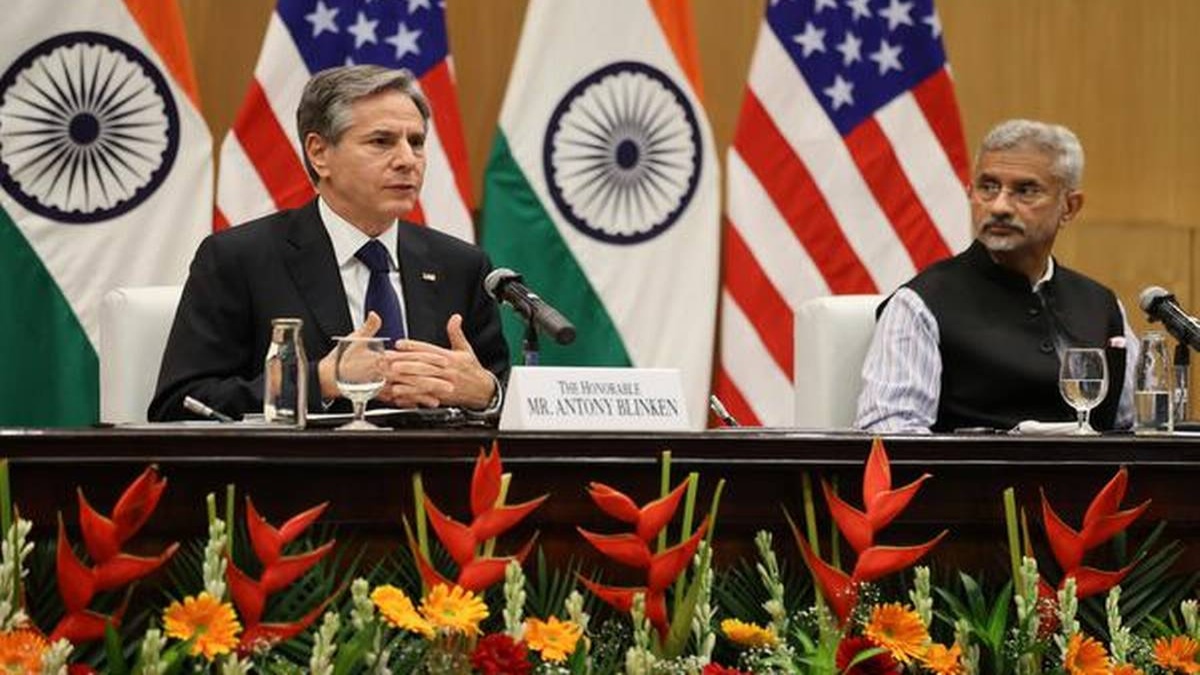


US Secretary of State Antony Blinken and Subrahmanyam Jaishankar held detailed and extensive discussions on a wide range of issues including China, Afghanistan conflict, Taliban, the Indo-Pacific. Pakistan also figured during the discussion when both the leaders delved into regional security issues, with terror financing and terrorist activities emanating from ‘neighbouring country’ being very much on the agenda. Sources told The Daily Guardian that Pakistan-based terror activities and Taliban’s violent act being supported by Pakistan were the issues that featured in the meeting between National Security Advisor (NSA) Ajit Doval and Blinken on Wednesday. Blinken also met Prime Minister Narendra Modi in the evening.
“Good to meet US Secretary of State @SecBlinken today. I welcome President Biden’s strong commitment to strengthen the India-US Strategic Partnership, which is anchored in our shared democratic values and is a force for global good,” PM Modi tweeted.
What came as a welcome development for MEA was that India and the US had a strong convergence of views on many regional and global issues that were discussed during these meetings with Blinken. EAM Jaishankar tweeted, “A wide ranging and productive discussion today with secretary Blinken. Useful in mapping out the next steps in our bilateral partnership. Strong convergence of views on many regional concerns. Agreed to work closely on multilateral and global issues.”
US Secretary of State Blinken actually confirmed what Jaishankar tweeted when he sent out a substantial message to all those who are posing a threat to regional security. On Afghanistan, Blinken’s message was for Taliban, Pakistan and China, as he said, “We both agreed strongly that any future government in Afghanistan has to be inclusive and fully representative of Afghan people. Ultimately it has to be an Afghan-led and Afghan-owned peace process.” Significantly, this has been the stand and
line of India vis-à-vis the future of Afghanistan. So, Blinken put a stamp of approval on what India has been reiterating about the future government of Afghanistan. His message was for both the Taliban and Pakistan. Blinken’s message was also for China which is reportedly trying to meddle in Afghanistan in a bid to increase its influence there. Similarly, Blinken is aware how Pakistan’s state actors are backing the Taliban due to their vested interests. What next Blinken said was also a strong message for all of them-Taliban, China and Pakistan. He said that even if American troops are withdrawing from Afghanistan, the US will remain engaged there.
Further, on the fast-evolving situation in Afghanistan, Blinken said India and the US share a strong interest in a peaceful, secure and stable Afghanistan adding that both the nations are committed to the proposition that there is no military solution to the conflict in the region. The US official also noted that there has to be a peaceful resolution in Afghanistan that requires the Taliban and the Afghan government to come to the table. In a message to China, Blinken mentioned that India and the US share a vision of a free, open, secure and prosperous Indo-Pacific.
Sources said that Blinken expressed concern over the manner in which terror organisations like Al-Qaeda and Lashkar-e-Taiba are increasing their activities in Afghanistan. Both Blinken and Jaishankar stressed the need for Pakistan to rein in terrorist outfits on its soil, sources said.
In what is being seen as a message to those raising questions over democracy in India, Blinken said India and the US are two of world’s leading democracies where “diversity fuels our national strength.” He further pointed out that there are few relationships in the world that are more vital than one between the US and India. In a meeting with some civil society members, the US top diplomat stated that the US and India share a commitment to democratic values. He said it is part of the bedrock of the bilateral relationship.
He noted that Indians and Americans believe in human dignity, in equality of opportunity, the rule of law, and fundamental freedoms, including freedom of religion and belief. He further pointed out that all people deserve to have a voice in their government and be treated with respect no matter who they are. Further stating that both the democracies “are works in progress”, Blinken noted that “as friends we talk because doing hard work of strengthening democracy is often challenging.” “At a time of rising global threats to democracy and international freedoms – we talk about a democratic recession — it’s vital that we two world leading democracies continue to stand together in support of these ideals,” he noted. Covid-19 issues were also discussed on priority during the meet and EAM acknowledged the responsiveness of the Biden administration for keeping the raw material supply chain open for vaccine production in India. “We focussed today on expanding vaccine production to make it globally available and affordable,” Jaishankar said. Blinken, on the other hand, announced $25 million assistance to support Covid vaccination efforts across India.
India’s quest for a permanent seat in UNSC was also discussed and Blinken reiterated US support for the same. “We spoke at length about regional concerns, multilateral institutions and global issues. The expanding Indian footprint, be it in Africa, Southeast Asia, or the Caribbean, has naturally broadened our shared agenda. Among the many issues we looked at, I would specifically note Afghanistan, Indo-pacific and the Gulf,” Jaishankar said.
In a clear-cut message to China, Jaishankar said that the Indo-pacific presents a different set of challenges, including ensuring that everyone observes international laws and rules.
“Under the aegis of Quad framework, we are engaged on maritime security, HADR, connectivity and infrastructure, cyber and digital concerns, counter-terrorism, Covid-19 response, climate action education, etc. The secretary and I not only discussed opportunities for future collaboration on all these issues, but also the importance of observing the international laws, rules and norms. Our ability to work together in the quad benefits the international community as a whole,” Jaishankar added.